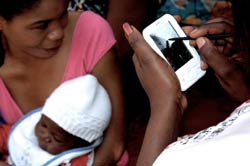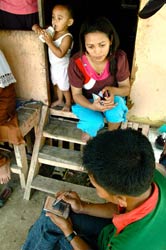Mobile communications technology revolutionizes global health programs
November / December, 2009 | Volume 8, Issue 6
By Jeff Gray
Cell phones, personal digital assistants and other hand-held devices are rapidly transforming the way medical information is collected in the developing world and hold enormous potential for monitoring outbreaks, facilitating research and improving health care delivery for millions.
Hundreds of scientists, information technology developers and policymakers gathered recently to discuss these topics at a mobile technologies meeting organized by the Foundation for the National Institutes of Health and sponsored by Microsoft Research. The three-day event, called the mHealth Summit, focused on the use of mobile technologies as tools and platforms for health research and healthcare delivery. The event drew an overflow crowd, with about 500 attending in person and hundreds more via webcast.

Photo courtesy DataDyne.org
Mobile technologies are proving to be
valuable tools for research projects conducted
in low-resource settings such as this measles
survey in Zambia.
"This is a wonderful time to focus on a topic that is clearly providing much opportunity both in research and in medical practice, but which has perhaps not been pulled together into one conference until now," said NIH Director Dr. Francis Collins, who identified mobile health technology as an area of great interest to NIH during his keynote speech. "I think the attendance of this meeting really indicates the way in which this has tapped into the interest of broad numbers of organizations and individuals in the public and private sectors, both here in this country and, in fact, around the world."
Though some of the discussions dealt with new software and devices, much time was devoted to existing technologies such as smart phones and short message service, commonly known as SMS or text messaging. While computers are still scarce in many parts of the world, cell phone usage is exploding in low-and middle-income countries. According to a recent U.N. report, mobile phones reached an average penetration rate of nearly 50 percent in developing countries in 2008, up from nearly zero 10 years ago.
"We've seen how the developing world is leapfrogging landline phones and going straight to mobile phones, and how this is improving lives in ways that we could never have imagined," said Ambassador Elizabeth Frawley Bagley, Special Representative for Global Partnerships at the U.S. Department of State.
Health and Human Services Secretary Kathleen Sebelius also emphasized the powerful potential of mobile health technology. "They're the most direct, convenient and dependable form of communication we have," she said. "We very strongly believe at HHS that this is a wave of the future and are very committed to not only experimenting with this technology but really driving it out."

Photo courtesy of DataDyne.org
Computers are still not widely
available in some countries but
mobile devices are becoming
ubiquitous.
Many of the presenters at the summit were researchers and physicians who already use mobile technologies to advance health care and clinical research in low-resource settings. They reported a number of benefits, including increased training opportunities for health workers and greater access to health-related information for isolated and rural populations. They also cited better diagnoses of patients and more actionable and current public health information as examples of improvements facilitated by mobile technology.
In contrast, Richard Gakuba, e-Health Coordinator for the Rwandan Ministry of Health, outlined some of the challenges the new technologies bring. "We lack a skilled mass of people who can bridge that gap between health care and IT, and who can understand the business practice of health care," he said. Some of the obstacles, such as the lack of significant IT skills among users of mobile devices in Rwanda, can be addressed through education, he suggested.
Confidentiality and security issues were also highlighted, and questions were raised about how to protect patients' privacy while using insecure devices like cell phones to transmit sensitive data. "You cannot have data that is both useful and completely anonymous," said Dr. Mani Srivastava of the University of California, Los Angeles. Concerns about recycled cell phones and computers being used to manage patient information and other medical data were also voiced.
The overall mood of the conference, however, was one of optimism. Fogarty Director Dr. Roger I. Glass commented on the youth and energy of the speakers. "The move to global health in the United States is really being driven on the university campuses, and there's tremendous enthusiasm," he said. "The ability to link this enthusiasm with mobile technology is a combination of both the altruism of global health as well as the high-tech that mobile health technology can bring to the developing world."
More Information
To view Adobe PDF files,
download current, free accessible plug-ins from Adobe's website.